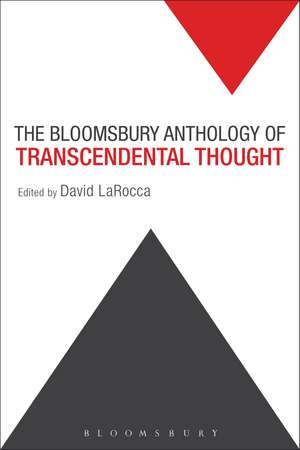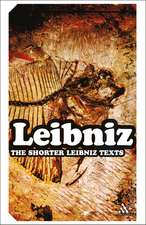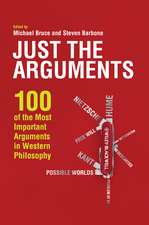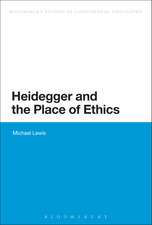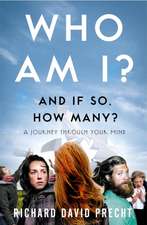The Bloomsbury Anthology of Transcendental Thought: From Antiquity to the Anthropocene
Editat de Dr. David LaRoccaen Limba Engleză Paperback – 5 apr 2017
| Toate formatele și edițiile | Preț | Express |
|---|---|---|
| Paperback (1) | 286.60 lei 6-8 săpt. | |
| Bloomsbury Publishing – 5 apr 2017 | 286.60 lei 6-8 săpt. | |
| Hardback (1) | 911.10 lei 6-8 săpt. | |
| Bloomsbury Publishing – 5 apr 2017 | 911.10 lei 6-8 săpt. |
Preț: 286.60 lei
Preț vechi: 314.65 lei
-9% Nou
Puncte Express: 430
Preț estimativ în valută:
54.85€ • 56.66$ • 45.65£
54.85€ • 56.66$ • 45.65£
Carte tipărită la comandă
Livrare economică 26 martie-09 aprilie
Preluare comenzi: 021 569.72.76
Specificații
ISBN-13: 9781501305559
ISBN-10: 1501305557
Pagini: 848
Dimensiuni: 178 x 254 x 59 mm
Greutate: 1.47 kg
Editura: Bloomsbury Publishing
Colecția Bloomsbury Academic
Locul publicării:New York, United States
ISBN-10: 1501305557
Pagini: 848
Dimensiuni: 178 x 254 x 59 mm
Greutate: 1.47 kg
Editura: Bloomsbury Publishing
Colecția Bloomsbury Academic
Locul publicării:New York, United States
Caracteristici
Writing by some of finest and most influential thinkers of the past 2,500 years all gathered to address a shared human conundrum that has preoccupied the West's most capacious, imaginative, and noteworthy intellects
Notă biografică
David LaRocca is Visiting Assistant Professor in the Cinema Department at Binghamton University, USA. Recently, he was Visiting Assistant Professor in the Department of Philosophy at the State University of New York College at Cortland, USA; Visiting Scholar in the Department of English at Cornell University, USA; and Lecturer in Screen Studies in the Department of Cinema, Photography, and Media Arts at the Roy H. Park School of Communications at Ithaca College, USA. He is the author of On Emerson (2003), Emerson's English Traits and the Natural History of Metaphor (2013), and Estimating Emerson: An Anthology of Criticism from Carlyle to Cavell (2013).
Cuprins
Introduction by David LaRocca Defying Definition: Opening Remarks on the TranscendentalPLATO Phaedrus Phaedo ParmenidesARISTOTLE Metaphysics Posterior AnalyticsSvetasvatara Upanishad First, Second, and Third AdhyâyaVimalakirti from The Vimalakirti Sutra Beyond Comprehension Lucretius from On the Nature of ThingsLonginus from On the Sublime Plotinusfrom the Enneads Third Tractate: The Knowing Hypostases and the Transcendent Augustine of Hippo from the ConfessionsBenedict of Norcia from The RuleIbn Sina (Avicenna) On the Rational SoulIbn Rushd (Averroës) from On the Harmony of Religion and PhilosophyThomas Aquinasfrom the Summa Theologica Of Man Who is Composed of a Spiritual and a Corporeal SubstanceDuns Scotus Concerning Metaphysics, The Science of the Transcendentals Dante Alighieri from the Divine Comedy: Paradiso (1308-21) Michel Montaigne from Essays (1587-88) "Of Experience" William Shakespeare Seven Soliloquies from Hamlet (1599/1602)George Herbert from The Temple, Sacred Poems and Private Ejaculations (1633)The Altar The Agonie Sinne (I) Affliction (I) The Quidditie The Starre Vanitie Mortification Miserie DeathRené Descartesfrom Meditations on First Philosophy (1641) Sixth Meditation: "Of the Existence of Corporeal Things and of the Real DistinctionBetween the Mind and Body of Man"Blaise Pascal from Pensées (1669) The PhilosophersBaruch Spinoza from The Ethics (1677) Concerning God On the Nature and Origin of the MindEdmund Burke from A Philosophical Enquiry into the Origin of Our Ideas of the Sublime and Beautiful (1756)Johann Just Winckelmann from Reflections on the Painting and Sculpture of the Greeks (1759) On Grace in Works of Art Immanuel Kant from The Critique of Pure Reason (1781/87) Of the Principles of a Transcendental Deduction in General Transition to the Transcendental Deduction of the Categories Of the Supreme Principle of all Synthetical Judgments Second Analogy: Principle of the Succession of Time According to the Law of Causality Refutation of Idealism Fourth Paralogism: of Ideality Johann Gottlieb Fichtefrom Characteristics of the Present Age (1806) Mysticism as a Phenomenon of the Third AgeGeorg Wilhelm Friedrich Hegel from The Phenomenology of Spirit (1807) Freedom of Self-Consciousness: Stoicism, Skepticism, and the Unhappy Consciousness Germaine de Staël from Germany (1813) Kant Samuel Taylor Coleridge Dejection: An Ode (1802) from Biographia Literaria (1817)William Wordsworth Ode: Intimations of Immortality from Recollections of Early Childhood (1807) from The Prelude; or, Growth of a Poet's Mind (1850) [Intimations of Sublimity] Imagination, How Impaired and Restored William Ellery Channing Likeness to God (1828)Arthur Schopenhauerfrom The World as Will and Idea (1818/19) The World as Idea, First Aspect The Failure of Philosophy: A Brief Dialogue The Vanity of Existence Friedrich Daniel Ernst Schleiermacher from The Christian Faith (1821)Sampson Reedfrom Observations on the Growth of the Mind (1826) Johann Gottfried von Herderfrom The Spirit of Hebrew Poetry (1782/1833) Thomas Carlylefrom Sartor Resartus: The Life and Opinions of Herr Diogenes Teufelsdröckh (1833) Pure Reason Symbols Natural Supernaturalism Ralph Waldo Emerson The Transcendentalist (1841)Margaret Fuller from Woman in the Nineteenth Century (1845) Swedenborg, Fourier, and GoetheKarl Marx Theses on Feuerbach (1845)Søren Kierkegaard from Concluding Unscientific Postscript to the Philosophical Fragments (1846) The Task of Becoming Subjective The Subjective Truth, Inwardness; Truth is SubjectivityHerman Melvillefrom Moby-Dick; or, The Whale (1851) The Mast-Head The Whiteness of the Whale Henry David Thoreaufrom Walden; Or Life in the Woods (1854) Higher Laws from Journals, 1837-1861 Gerard Manly Hopkins Nondum "Verily Thou art a God that hidest Thyself" Starlight Night The Lantern out of Doors Thee, God, I come from The Leaden Echo and the Golden EchoMatthew Arnoldfrom Culture and Anarchy (1869) Hebraism and Hellenism Fyodor Dostoyevsky from The Brothers Karamazov (1879/80) The Grand Inquisitor Friedrich Nietzsche from Beyond Good and Evil: Prelude to a Philosophy of the Future (1886) On the Prejudices of Philosophers What is Religious?Walter Pater from Appreciations Coleridge (1889) Emily Dickinson from Poems (1890)Charles Sanders Peirce The Law of Mind (1892)Leo Tolstoy Reason and Religion (1895)Swami Vivekananda The Absolute and Manifestation (1896)Josiah Roycefrom The World and the Individual (1899) The Fourth Conception of BeingSigmund Freud from The Interpretation of Dreams (1900)William James from The Varieties of Religious Experience (1901/2) The Reality of the UnseenPaul Deussenfrom Outlines of Indian Philosophy with an Appendix on the Philosophy of the Vedanta in its Relations to the Occidental Metaphysics (1907) Henry Adams from The Education of Henry Adams (1907) The Dynamo and the VirginHenri Bergson Beyond the Noumenal (1907)Marcel Proust from Swann's Way (1913)Franz Kafka from The Trial (1915) Before the Law Ludwig Wittgenstein from the Notebooks (1916) John Deweyfrom Democracy and Education (1916) The Individual and the World Bertrand Russellfrom Mysticism and Logic (1917)Oswald Spengler from The Decline of the West (1918) Franz Rosenzweig from Understanding the Sick and Healthy (1921)George Santayanafrom Skepticism and Animal Faith (1923) Some Authorities for this Conclusion Reinhold Niebuhr from Discerning the Signs of the Times (1946) Mystery and Meaning Simone Weil The Love of God and Affliction (1951) Edmund Husserlfrom The Crisis of European Sciences and Transcendental Phenomenology (1954)Martin Heidegger from An Introduction to Metaphysics (1959) The Limitation of BeingPaul Tillich from The Dynamics of Faith (1967)Bernard Williams Wittgenstein and Idealism (1973)Stanley Cavell Emerson, Coleridge, Kant (Terms as Conditions) (1983)Michel Foucault What is Enlightenment? (1984)Emmanuel Levinas Transcendence and Intelligibility (1984)Jean-Francois Lyotard The Sublime and the Avant-Garde (1984)Giorgio Agamben The Thing Itself (1987)Donald Davidson The Conditions of Thought (1989)Iris Murdoch from Metaphysics as a Guide to Morals (1989/1992) Fact and ValueSlavoj Zizek from The Sublime Object of Ideology (1989) "Not Only as Substance, but Also as Subject"Gilles Deleuzefrom The Logic of Sense (1990)from Difference and Repetition (1994)Jacques Derridafrom Aporias (1993) Finis ["Is my death possible?"]Richard Rorty Is Derrida a Quasi-Transcendental Philosopher? (1995)Gayatri Chakravorty Spivak from A Critique of Postcolonial Reason (1999) PhilosophyLuce Irigaray Approaching the Other as Other (1999) Spiritual Tasks for Our Age (2004)Alain Badioufrom Deleuze: The Clamor of Being (2000) Univocity of Being and the Multiplicity of Names Jacques Rancière The Janus-Face of Politicized Art (2003)Charles Taylorfrom A Secular Age (2007)AcknowledgmentsCredits
Recenzii
The concept of the transcendental is often invoked in philosophy and literature, but until now its history has been neglected. This volume, bringing together a variety of writings from different disciplines and different traditions, allows us to begin to reflect on the character of this elusive concept. In that sense, this volume is more than an overview of a field of study-it is participating in the creation of one.
A splendid collection of some of the deepest thoughts of which humans are capable. The book is full of insights and surprises.
In the editor's own words, this anthology is at once 'essential' and 'impossible,' since it portends to give textual shape to a topic that has defied the entire tradition of Western philosophy, which concerns the very question from which all philosophizing begins, i.e., the transcendental. In taking up this task, LaRocca assumes more the guise of a curator than an editor, and provides us with a veritable Kunstkammer, that is, a cabinet of curiosities, a theater of memory, a world theater of philosophers, artists, and writers from all ages who have addressed the transcendental as a constant and elemental aspect of philosophy and life.
The Bloomsbury Anthology of Transcendental Thought brings together an excellent selection of texts from several philosophical perspectives on the question of the transcendental, demonstrating the complexity of the concept's meaning, its rich and often contradictory histories. Edited with great erudition and care by David LaRocca, the collection will be an indispensable handbook for anybody researching the heritage of that tradition.
In this unique and timely collection, David LaRocca offers us a thoughtful reminder that the very possibility and urgent task of thinking, of our acting and judging, ethics and politics, rests upon a willing exposure to an aspect of our everyday and ordinary experience that is hard to grasp and eludes most, perhaps all, epistemic criteria. Metaphysicians, mystics, and moral perfectionists of all stripes have called this 'the transcendental,' thus risking the fatal misunderstanding that this means only 'the transcendent,' leading to the dualist assumption that we are citizens of two separate (earthly and heavenly) cities or (phenomenal and noumenal) worlds. Yet the truth is far more simple, if much harder to accept and then also live by. We are what we are, here and now. Yet we're not, therefore, irrevocably bound by what thus is said 'to be'-much less by the proverbial powers that will always be-in what we can still further imagine and aim or hope for, against the odds, as it were. In this brilliantly edited and introduced anthology, LaRocca presents us with the broadest selection of authors, philosophers, visionaries, and artists, who have expressed this simple, difficult truth and freedom in the most profound and varied of ways.
A splendid collection of some of the deepest thoughts of which humans are capable. The book is full of insights and surprises.
In the editor's own words, this anthology is at once 'essential' and 'impossible,' since it portends to give textual shape to a topic that has defied the entire tradition of Western philosophy, which concerns the very question from which all philosophizing begins, i.e., the transcendental. In taking up this task, LaRocca assumes more the guise of a curator than an editor, and provides us with a veritable Kunstkammer, that is, a cabinet of curiosities, a theater of memory, a world theater of philosophers, artists, and writers from all ages who have addressed the transcendental as a constant and elemental aspect of philosophy and life.
The Bloomsbury Anthology of Transcendental Thought brings together an excellent selection of texts from several philosophical perspectives on the question of the transcendental, demonstrating the complexity of the concept's meaning, its rich and often contradictory histories. Edited with great erudition and care by David LaRocca, the collection will be an indispensable handbook for anybody researching the heritage of that tradition.
In this unique and timely collection, David LaRocca offers us a thoughtful reminder that the very possibility and urgent task of thinking, of our acting and judging, ethics and politics, rests upon a willing exposure to an aspect of our everyday and ordinary experience that is hard to grasp and eludes most, perhaps all, epistemic criteria. Metaphysicians, mystics, and moral perfectionists of all stripes have called this 'the transcendental,' thus risking the fatal misunderstanding that this means only 'the transcendent,' leading to the dualist assumption that we are citizens of two separate (earthly and heavenly) cities or (phenomenal and noumenal) worlds. Yet the truth is far more simple, if much harder to accept and then also live by. We are what we are, here and now. Yet we're not, therefore, irrevocably bound by what thus is said 'to be'-much less by the proverbial powers that will always be-in what we can still further imagine and aim or hope for, against the odds, as it were. In this brilliantly edited and introduced anthology, LaRocca presents us with the broadest selection of authors, philosophers, visionaries, and artists, who have expressed this simple, difficult truth and freedom in the most profound and varied of ways.
